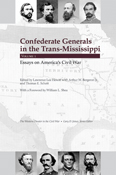Confederate Generals in the Trans-Mississippi, Vol. 1
Essays on America's Civil War

- Author(s): Hewitt, Lawrence L., with Arthur W. Bergeron and Thomas E. Schott, eds.
- Series:
- Imprint: Univ Tennessee Press
- Publication Date: 2013-04-30
- Status: Active
- Available in PDF: Price $38.47 | Buy Now
- Leaf eReader required for PDF ebooks
Until relatively recently, conventional wisdom held that the Trans-Mississippi Theater was a backwater of the American Civil War. Scholarship in recent decades has corrected this oversight, and a growing number of historians agree that the events west of the Mississippi River proved integral to the outcome of the war. Nevertheless, generals in the Trans-Mississippi have received little attention compared to their eastern counterparts, and many remain mere footnotes to Civil War history. This welcome volume features cutting-edge analyses of eight Southern generals in this most neglected theater—Thomas Hindman, Theophilus Holmes, Edmund Kirby Smith, Mosby Monroe Parsons, John Marmaduke, Thomas James Churchill, Thomas Green, and Joseph Orville Shelby—providing an enlightening new perspective on the Confederate high command.
Although the Trans-Mississippi has long been considered a dumping ground for failed generals from other regions, the essays presented here demolish that myth, showing instead that, with a few notable exceptions, Confederate commanders west of the Mississippi were homegrown, not imported, and compared well with their more celebrated peers elsewhere. With its virtually nonexistent infrastructure, wildly unpredictable weather, and few opportunities for scavenging, the Trans-Mississippi proved a challenge for commanders on both sides of the conflict. As the contributors to this volume demonstrate, only the most creative minds could operate successfully in such an unforgiving environment.
While some of these generals have been the subjects of larger studies, others, including Generals Holmes, Parsons, and Churchill, receive their first serious scholarly attention in these pages. Clearly demonstrating the independence of the Trans-Mississippi and the nuances of the military struggle there, while placing both the generals and the theater in the wider scope of the war, these eight essays offer valuable new insight into Confederate military leadership and the ever-vexing questions of how and why the South lost this most defining of American conflicts.
